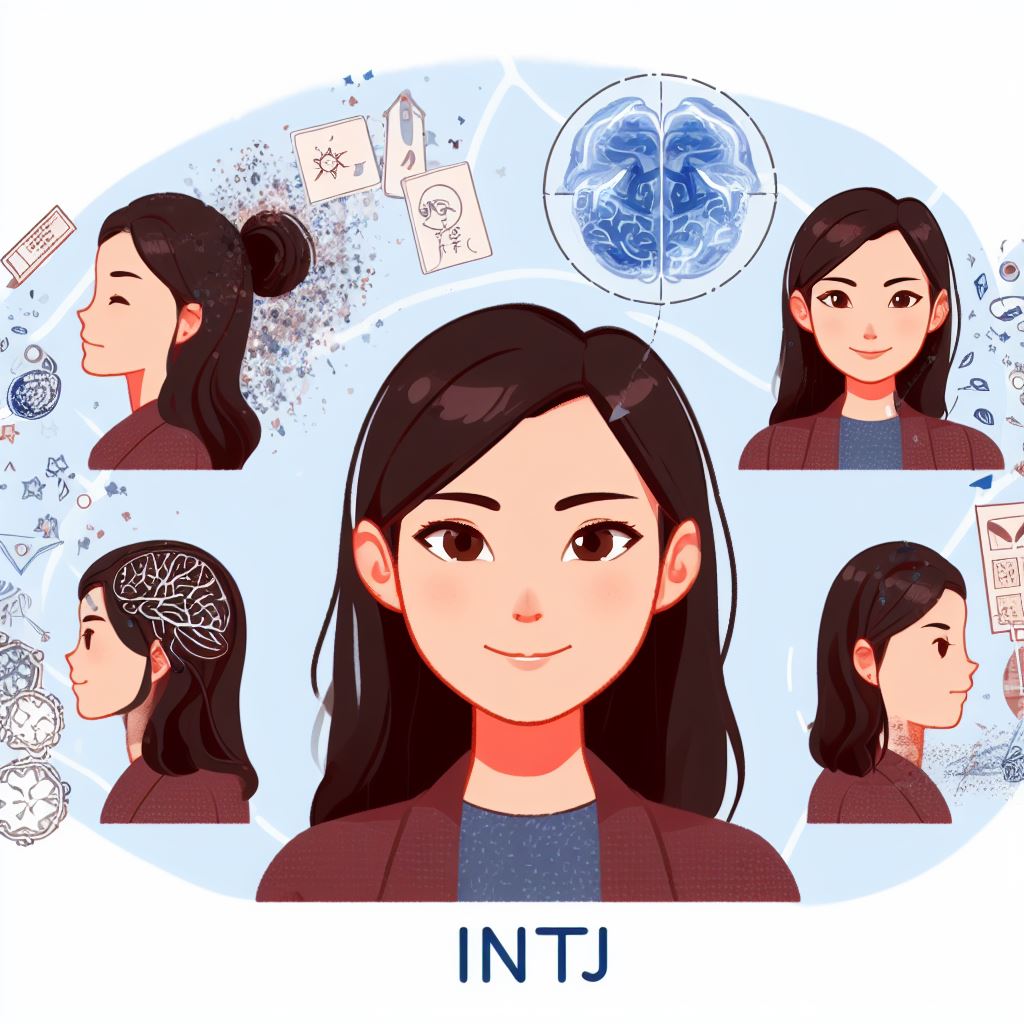
INTJs are intellectual, analytical and independent personalities, known for their foresight and strategic thinking. This type makes up about 2-4% of the general population, making INTJs one of the rarest personality types.

INTJs lead with introverted intuition (Ni) as their dominant function. This means they focus on interpreting patterns, symbols and subconscious insights to discern future possibilities. They take in information abstractly and holistically. INTJs also utilize extraverted thinking (Te) which allows them to logically organize their insights and implement systematic action plans.
With introverted feeling (Fi) as their third function, INTJs have an internal value system they may not express outwardly. And their fourth function is extroverted sensing (Se), giving them awareness of present surroundings that grounds their future visions. Overall, INTJs are visionary, pragmatic planners who think strategically and pursue knowledge, competence and efficiency.
As strategic thinkers who lead with intuition, INTJs often display the following traits:
Abstract and imaginative - INTJs make connections that others miss, envisioning possibilities. They think conceptually and symbolically.
Independent and self-directed - INTJs prefer following their own path over traditional authority or popular opinion. They have an inner drive for improvement.
Insightful and strategic - Detecting patterns gives INTJs a talent for analyzing situations and anticipating outcomes several moves ahead like a chess player.
Innovative problem-solvers - Convention bores INTJs, who jump at complex challenges. Their creativity generates unique solutions.
Need for intellectual stimulation - INTJs thrive when learning new skills and theories. Stagnation stifles them. Knowledge expansion is a lifelong pursuit.
Natural skepticism - INTJs do not take ideas or claims at face value. They critically examine concepts and look for logical inconsistencies.
Appreciation for competence - INTJs admire those with specialized expertise and technical skill. They respect knowledge and merit.
Desire for efficiency - As strategists, INTJs seek the quickest, most productive means to accomplish goals. They eliminate any unnecessary steps.
Frank and direct - INTJs get right to the core of issues and state their mind plainly. Social chit-chat does not come naturally.
Calm outward demeanor - INTJs appear reserved and serious much of the time. They do not react emotionally or make impulsive decisions.
When it comes to careers, INTJs appreciate solitary work or small teams where they can apply their strategic approach. Structure and certainty aid their productivity, while frequent interruptions may frustrate their focus. In relationships, INTJs desire growth-oriented partners who stimulate, but do not attempt to control them. Casual dating does not interest INTJs, who commit fully when they find a compatible mate.
Some of the natural talents associated with the INTJ include:
With their intuition and logic, INTJs have an exceptional ability to respond to multifaceted challenges. They grasp systems at a big picture and detailed level, letting them analyze and troubleshoot effectively.
Thought-oriented INTJs break away from convention and status quo. Their comfort with theoretical complexity allows them to generate inventive solutions and improvements.
INTJs easily comprehend complex systems and excel at learning specialized skills or processes. Turning concepts into actuality comes naturally. INTJs make talented programmers, engineers, scientists, etc.
INTJs' intuition constantly gathers impressions about the deeper meaning of events and symbols. This grants them a future vision that sees probable outcomes of choices and actions before they occur.
Rejecting conformity, INTJs scrutinize all ideas against their own rigorous standards. They follow their own counsel over traditional authority and think for themselves.
INTJs value truth over tact and express themselves plainly. They point out flaws others may hide from, which while not always welcomed, can spark improvement.
Static environments demotivate INTJs, who pursue lifelong learning. Their confident intellect craves new theories, skills and insights to build competence. Knowledge expansion is a core driver.
INTJs set ambitious goals for themselves and vigorously apply their energy towards achievement. They believe in constant personal progress.
With their intellectual nature and talents, INTJs contribute valuable insights and innovations to their pursuits. They strive to construct meaning and envision possibilities using their strategic thinking skills.
For INTJs, some of their less developed areas include:
Logic-focused INTJs struggle to articulate their inner emotional world. Their stoic exterior masks deep feelings. INTJs could benefit from making the effort to put emotions into words.
When systems or people do not operate to their capability, INTJs can become frustrated and harshly critical. More patience and diplomacy would benefit them.
INTJs chafe at bureaucratic constraints or rituals without clear purpose. But complete freedom from rules has downsides too. Learning detached flexibility helps INTJs work within necessary structures.
INTJs dismiss input from authority figures with less knowledge than themselves. But even intelligent INTJs have blindspots where humility serves them. Listening to wisdom from multiple sources is wise.
While logic serves them well, INTJs can justify questionable actions by defining them as efficient means to an end. Developing character and principles prevents excessive rationalization.
INTJs can make questionable assumptions when forming conclusions about people or situations. More observation before deciding helps INTJs gain insight.
INTJs naturally need solitary time to recharge. But too much isolation leads to communication challenges and hurts relationships. Making time for people important to them is vital.
INTJs take pride in relying on their own skills and knowledge. But asking for help or input from others when truly needed is not a weakness, and can make INTJs even more effective.
With self-awareness, INTJs can catch themselves over-using their natural strengths and develop more balance. Patience, emotional expression, collaboration and tactfullness will stretch the INTJ to grow.
Some personality types may match better with INTJs than others.
ENTP - Shared intuition and thinking preferences allows mutual understanding. Both stimulate each other's knowledge pursuits.
INTP - As fellow intuitive thinkers, the INTJ and INTP connect over complex concepts and logic.
ENTJ - INTJs and ENTJs see the big picture and strategize similarly but with different energy levels. Their strengths complement each other.
ENFJ - The ENFJ's natural empathy and focus on relationships helps balance the INTJ's rationality.
ESFP - ESFPs desire action and socializing versus the INTJ preference for theory. Intuition vs. sensing differences.
ISFJ - Conflicts may arise between the ISFJ's practicality and tradition versus INTJ innovation. Introverted sensing vs. intuition.
ESTP - ESTPs make quick decisions guided by facts. INTJs base choices on patterns. Thinking vs. intuition disconnects.
ENFP - While creative, ENFPs make emotional decisions unlike INTJ's logic. Introverted feeling vs. thinking contrast.
Personality clashes can occur, but understanding and communication improve all relationships. INTJs grow their diplomatic skills by appreciating types who approach life differently.
Some fulfilling careers that align well with the natural talents of INTJ personalities include:

Computer Systems Analyst - INTJs excel at learning complex systems and developing more efficient processes or designs. Technical troubleshooting suits them.
Software Developer - This career allows INTJs to integrate their logical and technical skills to create innovative programs or applications.
Scientist - INTJs thrive when using the scientific method to construct knowledge. Their intuition deciphers patterns in research data.
Engineer - Turning concepts into practical new products or structures comes naturally to INTJs. They learn specialized technical skills readily.
Lawyer – Analyzing cases, constructing arguments and anticipating counterpoints suits the strategic INTJ mind. Autonomy also appeals.
Professor – Teaching complex subjects in their field of expertise satisfies the INTJ desire for intellectual growth. Research also scratches their learning itch.
Management Consultant - As big picture strategists, INTJs craft systems to improve organization, productivity and profits.
Financial Analyst - This career provides challenging intellectually stimulating work analyzing complex data to optimize investment opportunities.
INTJs thrive in autonomous or leadership positions where they can utilize their strategic talents. Careers involving theory, technology, research, or complex problem solving allow INTJs to continually build expertise and satisfy their inquisitive minds.
For self-development, INTJs should consider strengthening skills that do not come naturally, like:
INTJs can be bluntly critical at times. Learning to frame corrections constructively helps INTJs give feedback in a tactful way that is better received.
INTJs often prioritize their inner intellectual world over social needs. But relationships require investment. INTJs should consciously schedule one-on-one time with people close to them.
Through journaling or open reflection, INTJs can better understand their inner emotions, motivations and blindspots. Self-knowledge helps INTJs recognize areas needing growth.
Logical INTJs do not always consider emotional outcomes. Intentionally evaluating how comments or actions affect others enhances INTJ's empathy and diplomacy.
As innovators, INTJs may reject tradition just for being traditional. But longtime practices often have hidden value. INTJs benefit frombalanced evaluation of convention.
INTJs hold strong opinions and naturally reject other views. Purposefully listening to diverse thoughts from different sources expands INTJs horizons.
When under pressure, INTJs can become rigidly locked into one mode of thinking. Conscious flexibility helps INTJs adapt more optimally as situations unfold unpredictably.
Targeted development complements natural INTJ strengths. Well-rounded collaborative skills combined with their strategic talents helps INTJs achieve their ambitious goals in any field.
Prominent figures displaying INTJ traits include:
Elon Musk
This ambitious inventor and entrepreneur envisions revolutionary futuristic innovations. He thinks strategically on a large scale.
Mark Zuckerberg
As the developer of Facebook, Zuckerberg used his technical skills and strategic vision to create a world-changing social network.
Larry Page
The Google co-founder is an innovative problem solver who strives to make information available to all. Page applies abstract insights practically.
Cormac McCarthy
This author crafts epic stories full of symbolism and metaphysical themes. His books probe philosophical questions.
Jane Austen
Austen wrote intricately plotted 19th century stories of sophisticated characters. Her observational skills provided deep insight.
Isaac Asimov
The influential sci-fi author envisioned creative futures grounded in scientific reality. Asimov's work reflects INTJ imagination.
Prominent INTJs throughout history demonstrate the power of insightful strategic thinking combined with technical skill. They envision revolutionary ideas and persistently work to shape future possibilities.
Creative strategists with a knack for complex problem solving, INTJs play the long game. Their intuition deciphers patterns leading to innovative theoretical insights. Teamed with logic and technical competence, the INTJ mind generates pioneering ideas and efficient systems. While introverted, INTJs desire growth-aligned relationships that stimulate mutual understanding. Mentally self-sufficient INTJs follow their own vision confidently but benefit from collaborating with different perspectives. With wisdom and balance, INTJs can apply their conceptual talents to make groundbreaking contributions that advance society.